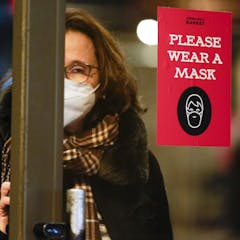
Articles sur Masks
Affichage de 1 à 20 de 131 articles

A previous review suggested that masks don’t work. We can assure you – they do.

We need to see suitable infection prevention measures alongside targeted public health campaigns to reduce COVID infections across the community.

Trust, particularly in government leaders, has diminished over time.

Wearing a mask at the shops, on public transport and in other crowded settings will improve your chances of a COVID-free Christmas.

People with a lung condition are among those particularly vulnerable to bushfire smoke. But you can prepare for the season ahead.

Major reviews of medical evidence, known as Cochrane reviews, have come under fire. But is that fair?

COVID-19 is the third-leading cause of death in Canada, but it’s older people who are dying. That we accept this and carry on as if the pandemic is over reveals our ageism: We don’t value older people.

An updated Cochrane Review suggests face masks don’t reduce the spread of COVID in the community. But there are several reasons why this conclusion is misleading.

Be prepared. Download an air quality app, stock up on respirators and stay inside if you can.

Decades of research show that respiratory illnesses are dramatically reduced when people wear face masks.

Strict lockdowns, quarantines and testing have prevented many people in China from catching COVID-19. With concerns over Chinese vaccine efficacy and uptake, China may be facing a looming COVID-19 surge.

For one, washing your hands is unlikely to prevent COVID spread.

In 2020, with adult ICUs at risk of being overwhelmed, we wore masks and accepted restrictions. Now pediatric intensive care is at risk. Will leaders follow the evidence and tell us to mask up?

During COVID, rich countries have used masks and gloves from their medical stockpiles. But not all countries are so fortunate. We found the best way to help. It may not be what you think.

Billions of face masks and other personal protective equipment have been used throughout the pandemic. Containing plastic, these items are damaging wildlife and their environments.

The latest COVID wave in the UK might be on the decline, but there will be more to come.

We expect businesses to be more socially and environmentally responsible by minimizing greenhouse gas emissions and eliminating harmful business practices — why don’t we do the same for COVID-19?

They’ve stopped short of mandates, but authorities and experts are strongly suggesting it’s time to cover our mouths and noses again to prevent COVID infection. This time, reach for a respirator.

If our immunity from COVID vaccines is waning, then wearing a mask to prevent infection is even more valuable. But not many people seem to be thinking that way when they’re out and about.

Based on certain criteria, New Zealand is clearly ‘winning’. But getting policy settings right over the long haul is about more than just having the most favourable assessment on selected criteria.
